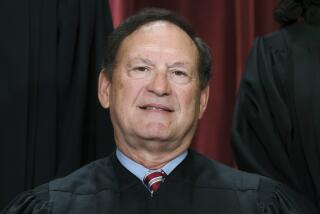Mukasey focuses on wiretaps
- Share via
WASHINGTON — President Bush’s choice for attorney general told senators Friday that the Constitution does not prevent the president from wiretapping suspected terrorists without a court order.
Michael B. Mukasey said the president could not use his executive power to get around the Constitution and laws prohibiting torture, but wiretapping suspected terrorists without warrants was not precluded.
“Foreign intelligence gathering is a field in which the executive branch is regulated but not preempted by Congress,” Mukasey wrote in response to questions by Senate Judiciary Committee Chairman Patrick J. Leahy (D-Vt.).
Mukasey’s letter was made public by Leahy on Friday as part of a larger package of documents in which judiciary committee members asked the retired U.S. district court judge from New York to elaborate on two days of oral testimony last week.
His answers focused on queries about executive power and did not address what Leahy and other senators have said was the chief obstacle to his confirmation: Mukasey’s refusal to say whether an interrogation method that simulates drowning amounts to torture outlawed under domestic and international law.
A letter signed by the committee’s 10 Democrats demanded that Mukasey answer that question. The panel’s senior Republican, Sen. Arlen Specter of Pennsylvania, has made the same request.
Several lawmakers have publicly said that their vote depends on whether Mukasey equates waterboarding with torture. Some Republicans have said privately that they also would be concerned if Mukasey didn’t answer that question.
Mukasey’s nomination needs the support of 10 senators on the 19-member panel to advance to the full Senate with a favorable recommendation. A Democrat familiar with the committee’s deliberations said Mukasey might not get the votes he needed unless he answered the waterboarding question. Leahy has refused to schedule a committee vote until Mukasey provides his answer.
Democratic aides said Leahy’s question about executive power was a secondary, but still important, matter. It wasn’t immediately clear whether Mukasey’s answer would be deemed acceptable by the lawmakers.
In a letter dated Oct. 18 but first disclosed Friday, Leahy said he was troubled by Mukasey’s answer during last week’s hearings that the president may be able to act in conflict with the 1979 Foreign Intelligence Surveillance Act in ordering warrantless eavesdropping.
More to Read
Get the L.A. Times Politics newsletter
Deeply reported insights into legislation, politics and policy from Sacramento, Washington and beyond. In your inbox twice per week.
You may occasionally receive promotional content from the Los Angeles Times.










